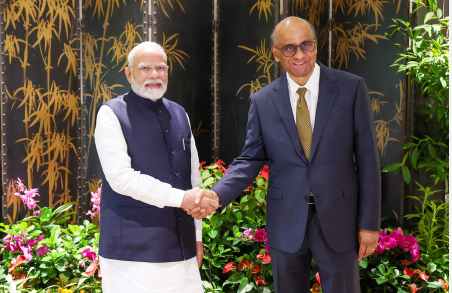In a transformative step for India’s fisheries sector, the central government has announced a new scheme to provide ‘digital identities’ to fishery industry workers. This initiative is seen as part of a broader effort by the government to empower and modernize the fisheries industry. At the heart of this initiative is the Pradhan Mantri Matsya Sampada Yojana (PMMSY), a scheme launched four years ago by the Narendra Modi-led government. With an impressive outlay of over ₹20,000 crore, PMMSY has been a significant pillar of support for the growth of the fisheries industry in India.
The introduction of digital identities to fishery workers is expected to revolutionize the industry, enabling more transparent, efficient, and organized operations while also empowering the workforce through enhanced access to government services and benefits. This article delves into the details of the new scheme, its alignment with PMMSY, the expected impact on the fisheries industry, and how it reflects broader trends in India’s drive towards digitalization and inclusion.
The Fisheries Sector in India: An Overview
India’s fisheries sector is one of the most important contributors to the country’s economy and food security. The country is the world’s second-largest producer of fish, with a coastline stretching over 8,000 kilometers and vast inland water resources. Fisheries and aquaculture provide livelihood to more than 14 million people in India, New Scheme many of whom work in small-scale or artisanal fishing operations.
The sector contributes significantly to the country’s Gross Domestic Product (GDP) and plays a crucial role in rural development, particularly in coastal and inland areas. It also serves as an important source of nutrition for millions of people. Despite its significance, the fisheries sector has faced several challenges over the years, New Scheme including inadequate infrastructure, lack of proper regulation, environmental concerns, and limited access to financial services for workers.
In recent years, however, the Indian government has taken several initiatives to address these challenges and promote the sustainable growth of the fisheries sector. The launch of the PMMSY in 2020 was a key step in this direction, aiming to modernize the sector, increase productivity, and enhance the income of fishery workers.
Pradhan Mantri Matsya Sampada Yojana (PMMSY): A Game-Changer for Fisheries
The Pradhan Mantri Matsya Sampada Yojana (PMMSY) is a flagship scheme launched by the Modi government to transform the fisheries sector in India. With a massive outlay of over ₹20,000 crore, PMMSY was designed to boost production, improve infrastructure, and promote sustainable practices in fisheries and aquaculture.  For the more information click on this link
For the more information click on this link
The PMMSY scheme focuses on several key areas, including:
- Enhanced Fish Production: The scheme aims to increase fish production in India by improving aquaculture practices, expanding fish farming activities, and promoting innovative technologies.
- Improving Infrastructure: PMMSY emphasizes building better infrastructure for the fisheries sector, including cold storage facilities, fish landing centers, and processing units to reduce post-harvest losses and ensure the quality of fish products.
- Promoting Sustainable Practices: The scheme promotes the adoption of environmentally friendly fishing practices to ensure the long-term sustainability of the fisheries sector.
- Welfare of Fishery Workers: A crucial aspect of PMMSY is the welfare of fishery workers. This includes providing financial support, access to insurance, and ensuring better working conditions for fishers, New Scheme fish farmers, and workers in the allied sector.
- Employment Generation: The scheme is also expected to create millions of direct and indirect employment opportunities in the fisheries and aquaculture sectors.
Since its launch, PMMSY has been instrumental in improving fish production, generating jobs, and supporting the livelihoods of millions of people dependent on the fisheries industry.
Digital Identities for Fishery Workers: A New Chapter in the PMMSY Vision
The recent announcement of the new scheme to provide digital identities to fishery workers is a significant addition to the PMMSY initiative. As part of the government’s broader vision of promoting digital inclusion and enhancing access to government schemes and services, the introduction of digital identities is expected to provide multiple benefits to fishery workers and the industry as a whole.
The idea of a digital identity is not new in India. The success of Aadhaar, a unique identification number issued to Indian residents, has paved the way for using digital identities across various sectors. The Aadhaar system has allowed millions of Indians to access social services, financial products, and government welfare schemes efficiently. A similar approach is now being extended to the fisheries sector with the creation of a specialized digital identity for fishery workers.
Benefits of Digital Identities for Fishery Workers
Digital identities for fishery workers will help address several issues plaguing the sector and empower workers in numerous ways:
-
- Access to Government Services and Schemes: With digital identities, fishery workers will have direct access to various government schemes and subsidies. Many fishers and aquaculture workers are unaware of the benefits available to them, and digital IDs will help them access financial support, insurance, New Scheme and welfare schemes under PMMSY more easily.
- Financial Inclusion: Digital identities will enable workers in the fisheries sector to open bank accounts and access financial products such as loans and credit facilities, which are often out of reach for those working in informal or small-scale fisheries. This will help them invest in better equipment, New Scheme expand their operations, and improve their livelihoods.
- Transparency and Accountability: The introduction of digital identities will bring greater transparency to the fisheries sector. It will enable authorities to track the distribution of subsidies and benefits and ensure that they reach the intended beneficiaries. This will reduce corruption and ensure that resources are allocated efficiently.
- Welfare and Social Security: Fishery workers will be able to access social security schemes more easily, including health insurance, accident insurance, and pension schemes. The government can also track workers’ employment history and other relevant details, making it easier to provide targeted support and assistance.
- Data Collection and Management: The creation of digital identities will provide authorities with valuable data on the fisheries workforce, allowing for better planning and policy-making. It will enable the government to monitor employment trends, track the impact of various initiatives, New Scheme and identify areas where further support is needed.
- Promotion of Sustainable Practices: Digital identities will allow for better monitoring of fishing activities, ensuring that fishers adhere to sustainable practices and regulations. This will help combat overfishing and ensure the long-term health of marine and inland water ecosystems.
- Improved Working Conditions: The introduction of digital identities is expected to improve the working conditions of fishery workers. By formalizing the workforce and ensuring that workers are registered with government authorities, New Scheme the government can better regulate the sector and ensure that workers receive fair wages and benefits.
Challenges and Concerns
While the introduction of digital identities for fishery workers is expected to bring numerous benefits, it is not without challenges. Implementing such a large-scale initiative will require careful planning and coordination between government authorities, fisheries organizations, New Scheme and local communities.
Some potential challenges include:
- Awareness and Outreach: Many fishery workers, particularly in remote or rural areas, may not be aware of the benefits of digital identities. It will be crucial for the government to conduct outreach programs to educate workers about the scheme and how they can enroll.
- Digital Infrastructure: The success of the digital identity scheme will depend on the availability of digital infrastructure in coastal and inland fishing areas. In regions with limited internet access or technological resources, fishery workers may face difficulties in registering for and using their digital identities.
- Privacy and Data Security: As with any digital initiative, ensuring the privacy and security of personal data will be paramount. The government will need to put in place robust data protection measures to prevent the misuse of sensitive information.
- Resistance from the Workforce: Some fishery workers may be hesitant to adopt digital identities, especially if they are not familiar with digital technologies. The government will need to provide support and training to help workers transition to the new system.
- Coordination Among Government Agencies: The implementation of digital identities for fishery workers will require coordination between various government agencies, New Scheme including fisheries departments, financial institutions, and social security organizations. Ensuring seamless coordination will be key to the scheme’s success.
Broader Implications for the Fisheries Sector and India’s Economy
The introduction of digital identities for fishery workers is expected to have a transformative impact on the fisheries sector, aligning with the government’s broader goal of digitizing India’s economy and empowering its workforce. By formalizing the sector and improving access to financial services and government schemes, New Scheme the initiative will help increase productivity, enhance the livelihoods of workers, and promote sustainable practices.
This initiative is also a reflection of India’s broader push toward digitization, which has been a central pillar of the Modi government’s policies. From the Digital India campaign to the successful implementation of Aadhaar, the government has made significant strides in using digital technologies to streamline governance ,New Scheme reduce corruption, and promote financial inclusion.
For the fisheries sector, the introduction of digital identities represents a step forward in addressing some of the longstanding challenges that have hindered its growth. By improving the welfare of fishery workers, enhancing access to financial resources, and promoting sustainable practices, the initiative has the potential to unlock new opportunities for growth and development in the sector.
Conclusion
The announcement of a new scheme to provide digital identities to fishery industry workers is a landmark step in the government’s efforts to modernize India’s fisheries sector. As part of the larger PMMSY scheme, this initiative will help formalize the workforce, improve access to government schemes and financial services, New Scheme and promote sustainable practices.
While there are challenges to be addressed, including awareness, digital infrastructure, and privacy concerns, the long-term benefits of digital identities for fishery workers are substantial. By empowering workers and enhancing transparency. ALSO READ:-Vinesh Phogat Files Nomination from Haryana’s Julana Seat: A Wrestling Champion’s Foray into Politics 2024





